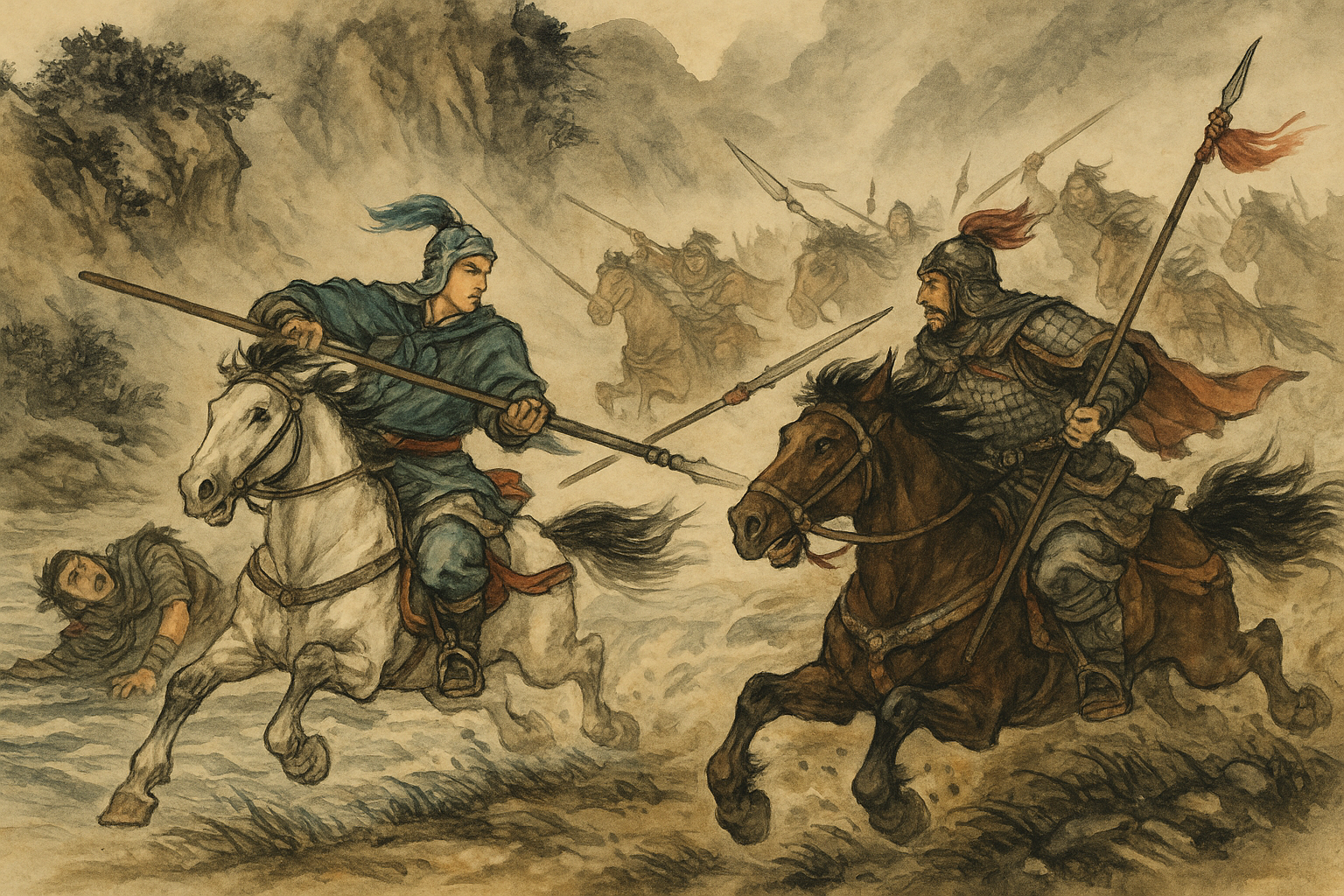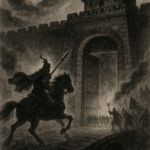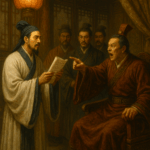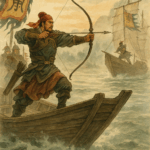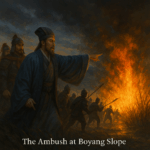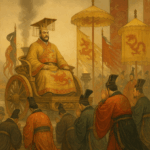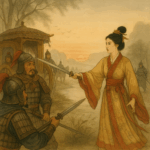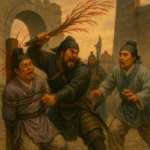Sun Jian found himself surrounded by Liu Biao’s forces. Only thanks to the valiant sacrifices of Cheng Pu, Huang Gai, and Han Dang did he break through the encirclement—though most of his troops were lost. He beat a hasty retreat back to Jiangdong, vowing bitter enmity with Liu Biao from that day on.
Yuan Shao Seizes Ji Province
Meanwhile, Yuan Shao had established camp in Henei but soon ran low on provisions. Han Fu, Inspector of Ji Province, dispatched grain convoys to sustain his army. Feng Ji, one of Yuan Shao’s strategists, urged him:
“A man who aspires to rule cannot rely on others to feed his troops. Ji Province is famed for its abundance—why not seize it outright?”
Yuan Shao replied, “I lack a good plan.” Feng Ji answered, “Secretly send word to Gongsun Zan, urging him to march on Ji Province and divide it with you. He will surely rise in arms. Han Fu, a man of no talent, will gladly cede command to you—and you can claim the province without striking a blow.”
Delighted, Yuan Shao dispatched a clandestine letter to Gongsun Zan. Upon receipt, Gongsun Zan—leader of the White Horse Volunteers—read of the proposed joint invasion, summoned his troops, and prepared to march on Ji Province.
Yuan Shao’s agents also warned Han Fu. Alarmed, Han Fu conferred with his advisers Xun Chen and Xin Ping. Xun Chen counseled:
“Gongsun Zan’s cavalry from Yan and Dai commands will sweep down upon us with unstoppable force—and Liu Bei, Guan Yu, and Zhang Fei stand ready to join him. How can we resist? Better to invite Yuan Shao to share the province’s affairs; he will offer generous terms, and we shall be safe from Gongsun Zan’s designs.”
Thus Han Fu sent his Prefect of the Left, Guan Chun, to beg Yuan Shao’s aid. His Chief Clerk Geng Wu protested:
“Yuan Shao is a lone general with worn-out troops, now utterly at our mercy like an infant in our hands. Should we entrust him with the province, we might as well summon a tiger into our sheepfold.”
Han Fu answered, “I served the Yuan clan long ago—I will surrender Ji Province to those more capable. Why begrudge talent its due?”
Geng Wu shook his head in despair and, with more than thirty colleagues, resigned in protest—only he and Guan Chun remained, lying in wait beyond the city gate for Yuan Shao’s arrival.
When Yuan Shao’s army finally reached Ji, Geng Wu and Guan Chun sprang out with drawn swords to assassinate him. Yuan Shao’s general Yan Liang promptly executed Geng Wu; Wen Chou cut down Guan Chun. Yuan Shao then entered Ji Province, stripped Han Fu of all authority, appointed Han Fu “General of Gallant Strength,” and parceled out provincial powers to his own lieutenants—Tian Feng, Ju Shou, Xu You, and Feng Ji—seizing the province for himself. Humiliated beyond redemption, Han Fu fled for his life to Zhang Miao, Governor of Chenliu.
Gongsun Zan’s Vengeance
Gongsun Zan learned that Yuan Shao now ruled Ji Province. He sent his younger brother, Gongsun Yue, to claim a share for their family. Yuan Shao invited Gongsun Zan himself to discuss terms; Gongsun Yue turned back for the summons but was ambushed by a company of horsemen who claimed, “We are Chancellor Dong Zhuo’s household guards!” A volley of arrows felled Gongsun Yue, and he died on the spot.
Gongsun Yue’s head was brought back to Gongsun Zan, who flew into a rage: “Yuan Shao lured me into war against Han Fu only to seize the province himself—and now he sends Dong Zhuo’s men to murder my brother. How can this injustice go unanswered?”
He marshaled his own troops and marched on Ji Province. Yuan Shao rode out to meet him; their armies faced each other on opposite banks of Pan River. Yuan Shao’s banner flew to the east of the stone bridge, Gongsun Zan’s to the west.
From the bridge Gongsun Zan thundered, “Traitor! How dare you betray our oath?” Yuan Shao retorted from his bank, “Han Fu proved unworthy of the province—what business is it of yours?”
“Only yesterday I named you盟主, champion of righteousness,” cried Gongsun Zan. “Now you behave like a wolf in sheep’s clothing—how can you stand in the world?”
Enraged, Yuan Shao demanded, “Who will seize him?” Before the words left his lips, Wen Chou spurred forward and led a thousand crossbowmen onto the bridge. Gongsun Zan awaited him there, and their spears clashed in furious combat. After a dozen moves Gongsun Zan’s guard broke; he turned and fled. Wen Chou pursued him into the heart of his army, cutting down anyone who stood in his path. Gongsun Zan’s four greatest captains rallied to his side, but Wen Chou’s lance felled one, and the others scattered.
Wen Chou drove Gongsun Zan clear off the bridge; Gongsun Zan slipped from his saddle into the river. Wen Chou urged him to yield—“Disarm and surrender!”—but Gongsun Zan snatched a spare bow and helmet, lashed them to a tree, and swam for shore under cover of night. The pursuing soldiers saw only the helmet and halted, while Gongsun Zan escaped into the hills.
Zhao Yun’s Heroics
Witnessing Wen Chou’s triumph, Yuan Shao’s vanguard commander Qu Yi advanced with eight hundred archers and fifteen thousand foot soldiers. He arrayed them in the center, while Yuan Shao himself held the reserves. Gongsun Zan, freshly reunited with his ally Zhao Yun—the famed “General of Changshan”—placed Zhao Yun in the rear with a separate command. He sent his veteran general Yan Gang to lead the vanguard while he himself held the bridge.
From dawn (辰時) until mid-morning (巳時), neither side dared move. Then Qu Yi’s archers, sheltered behind cover, loosed a volley. Yan Gang’s troops charged through the arrow-storm—only to be cut down by Qu Yi’s blade. Gongsun Zan’s lines shattered; across both flanks Wen Chou and Yan Liang’s crossbowmen rained bolts on them. Yuan Shao’s army pressed up to the bridge and severed Gongsun Zan’s banner. Gongsun Zan saw his standard fall, turned his horse, and fled. Qu Yi’s men pursued, but Zhao Yun spurred in to intercept them. He unhorsed Qu Yi with a single thrust, then rode like a man possessed through the enemy ranks, scattering them as if they were straw. At that signal, Gongsun Zan’s men rallied, drove Yuan Shao’s army back, and reclaimed the bridge.
Liu Bei, Guan Yu, and Zhang Fei Ride to the Rescue
As Yuan Shao’s survivors regrouped five li east, they heard the thunder of warhorses behind them. Turning, they beheld three riders charging into the fray: Liu Bei with his twin swords, Guan Yu brandishing his Green Dragon Crescent Blade, and Zhang Fei wielding his seven-chi serpent spear.
Yuan Shao recoiled in terror as his precious Seven-Jewel Sword clattered to the ground. He urged his men to fight on, but his generals could not hold the line. Liu Bei, Guan Yu, and Zhang Fei cut their way through until the remainder of Yuan Shao’s host broke and fled. Gongsun Zan, returning to his camp, embraced his rescuers amid tears of gratitude: “Had you not come, I would have perished.”
A Temporary Truce
For more than a month the two armies faced each other without decisive action. Then Li Ru advised Dong Zhuo in Chang’an:
“Yuan Shao and Gongsun Zan are among the realm’s greatest heroes. Let us feign an imperial summons—send envoys with the Emperor’s edict to broker peace. Their gratitude will bind them to our cause.”
Dong Zhuo approved. The next day he dispatched his tutors Ma Ri Di and Zhao Qi bearing the Emperor’s decree. They rode into Ji Province and were met by Yuan Shao after a hundred li. Next morning they crossed Pan River to Gongsun Zan’s camp and delivered the edict.
Both lords, awed by the imperial mandate, agreed to lay down arms and return to their garrisons. Yuan Shao recalled his forces home and, in his memorial to court, recommended Liu Bei as Prefect of Pingyuan. Liu Bei bade farewell to Zhao Yun with tears: “You are no mere subordinate of Gongsun Zan—you are a peerless hero!” Zhao Yun sighed, “I once mistook Gongsun Zan for a hero; now I see he is but one among many like Yuan Shao.” Liu Bei smiled gently: “Serve him with patience—our paths will cross again.”
New Grudges and Alliances
In Nanyang, Yuan Shu learned that Yuan Shao now ruled Ji Province and begged a thousand warhorses; Yuan Shao refused, and the brothers’ rivalry deepened. Yuan Shu also asked Liu Biao for two hundred thousand bushels of grain; Liu Biao refused. Nursing his resentment, Yuan Shu secretly wrote Sun Jian, urging him to attack Liu Biao:
“Liu Biao blocked your retreat; you must now strike him. I will seize Ji Province from Yuan Shao—strike swiftly!”
Sun Jian, stung by the memory of Liu Biao’s betrayal, summoned his captains Cheng Pu, Huang Gai, and Han Dang. Cheng Pu warned, “Yuan Shu is untrustworthy.” Sun Jian replied, “My quarrel is mine alone—I need no help from Yuan Shu.” He instructed Huang Gai to prepare transports and weapons at the riverbank; soon his armada stood ready.
Spies among Liu Biao’s ranks reported these preparations. Alarmed, Liu Biao convened his advisers. Kuai Liang counseled, “Better to build earthworks and wait for relief from Yuan Shao.” Cai Mao retorted, “Such passivity courts disaster. Let us sally forth and decide this now.” Liu Biao followed Cai Mao’s bold plan and arrayed his army on Xian Mountain.
Sun Jian, leading his victorious troops, charged out of his boats. Cai Mao confronted him in single combat. Cheng Pu broke through with his iron-ribbed spear and routed Cai Mao’s men. Sun Jian’s army surged forward, slaughtering the defenders until none remained in the fields. Cai Mao fled back into Xiangyang, and Kuai Liang urged his execution—but Liu Biao, for the sake of family ties, spared him.
Sun Jian’s forces ringed Xiangyang and began their siege. One afternoon a sudden gale snapped Gongsun Zan’s chief battle standard in two. Han Dang warned, “This is no auspicious sign—we should retreat.” Sun Jian retorted, “Every day we march has seen victory; shall a broken standard halt our siege?” He pressed on despite the omen. That night Kuai Liang read the stars and saw ill fortune for Sun Jian. He told Liu Biao: “Sun Jian will fall by dawn—send a thousand brave men to ambush his rear.”
Liu Biao summoned veteran general Lü Gong and entrusted him with five hundred cavalry and a company of archers to slip out under cover of darkness. At dusk Lü Gong led his men through Xiangyang’s eastern gate, while Sun Jian’s scouts reported a raiding party fleeing toward Xian Mountain. Mistaking them for fugitives, Sun Jian pursued with thirty horsemen. Approaching the wooded slopes, he fell into Lü Gong’s ambush: rocks rained down and arrows struck him—he died with his standards still flying. He was but thirty-seven years old.
Lü Gong then slew Sun Jian’s thirty escorts, ignited signal fires, and fled back to Xiangyang. In the ensuing chaos, Huang Gai charged ashore with his river fleet and clashed with Liu Biao’s commander Huang Zu, ultimately capturing him. Cheng Pu protected Sun Ce, Sun Jian’s eldest son, and sought a path of retreat. Encountering Lü Gong again, he bested him in single combat and broke through the blockade, rescuing Sun Ce.
Back in Xiangyang, Liu Biao’s officers bore Sun Jian’s body into the city and laid it in state. Sun Ce wept openly: “My father lies among the dead—how can I ever return home?” Huang Gai proposed ransom: “Let me bring Huang Zu into our camp as hostage. We will trade him for Sun Jian’s coffin.” A trusted envoy Huan Jie offered to negotiate. Liu Biao agreed, but Kuai Liang protested that any truce would be worthless until Liu Biao’s armies had proved themselves.
Thus did Sun Jian fall by treachery and bravery alike, while the fragile alliances between Yuan Shao, Gongsun Zan, Cao Cao, and Liu Biao shifted again in the crucible of war.
